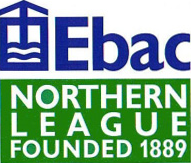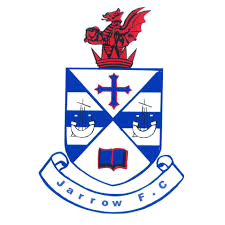
The Northern League is a men's football league in north east England. Having been founded in 1889, it is the second-oldest football league in the world still in existence after the English Football League.
Sunderland Albion Football Club was an English association football club based in Sunderland, England, formed in 1888. The club played in the Football Alliance, a rival to the Football League, before disbanding in 1892.

Consett Association Football Club is a football club based in Consett in County Durham, England. They are currently members of the Northern Premier League Division One East and play at Belle View Stadium.
The Northern Football Alliance is a football league based in the North East, England. It has four divisions headed by the Premier Division, which sits at step 7 of the National League System.
The North Eastern League was an association football league for teams in the North East of England.

Sunderland A.F.C. Academy is the collective name for the youth development squads of Sunderland Association Football Club, primarily the U18 and U21 teams. Sunderland have an 'Elite' Category 1 football academy based on the Elite Player Performance Plan and their teams are members of the Professional Development League.
Keith Graydon is an Irish footballer who plays for Morpeth Town as a midfielder and a striker.

Jarrow Football Club is a football club based in Jarrow, Tyne and Wear, England. They are currently members of the Northern League Division Two.

Richard Healey was an English footballer who played as an inside right or centre forward in the Football League for Sunderland, Middlesbrough and Darlington.

Shankhouse Football Club was a football club based in Cramlington, near Newcastle-upon-Tyne in England, between 1883 and 2021. They played at Action Park. The club was a FA Charter Standard Club affiliated to the Northumberland Football Association. The club's nickname was The House.
Peter Jonathan Kirkham is an English former footballer who played as a winger in the Football League for Darlington.

South Shields Football Club is a professional association football club based in South Shields, Tyne and Wear, England. The team competes in the National League North, the sixth level of the English football league system.
The 2018–19 season was the 121st in the history of the Northern Football League, a football competition in England. The league has operated two divisions in the English football league system, Division One at step 5, and Division Two at step 6.
The 2019–20 season was the 122nd in the history of Northern Football League, a football competition in England. The allocations for Steps 1 to 6 for season 2019–20 were announced by the FA on 19 May. These were subject to appeal, and the Northern League's constitution was ratified at the league's annual general meeting (AGM) on 15 June.
Redcar and Coatham Football Club was a football club based in Redcar, England.
Gateshead Association F.C. was an English association club based in Gateshead, then in County Durham. The Association was part of the club's name and habitually referred to as Gateshead Association or Gateshead (A).
Elswick Rangers F.C. was an English association club based in Newcastle-upon-Tyne.
Morpeth Harriers Football Club is the name of two football clubs from Morpeth, in Northumberland.
Gateshead N.E.R. F.C. was an English association club based in Gateshead, then in County Durham.

Darlington St Augustine's Football Club was a football club based in Darlington, England. It was most notable for being the winner of the first Northern Football League in 1889–90.







